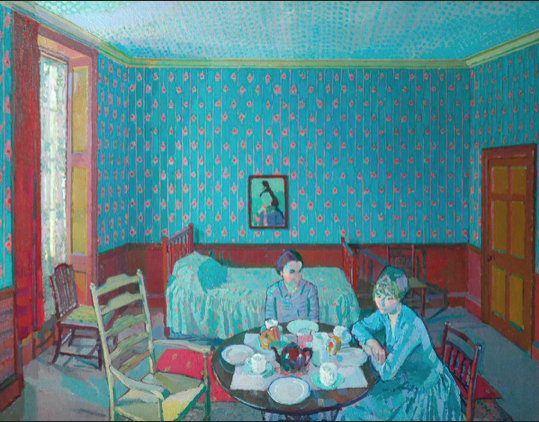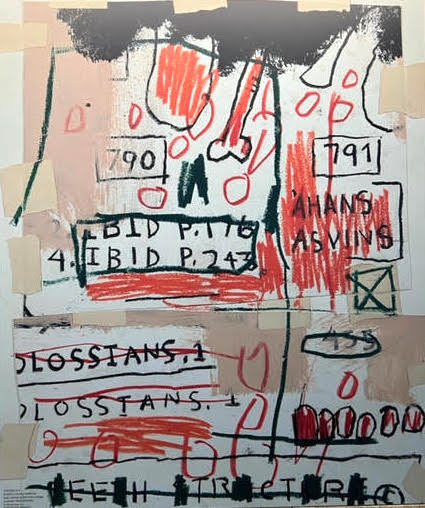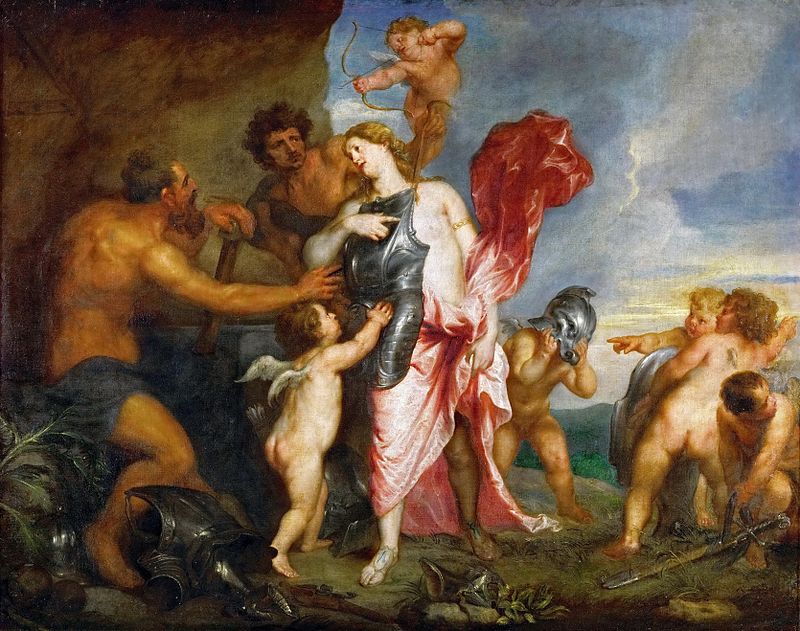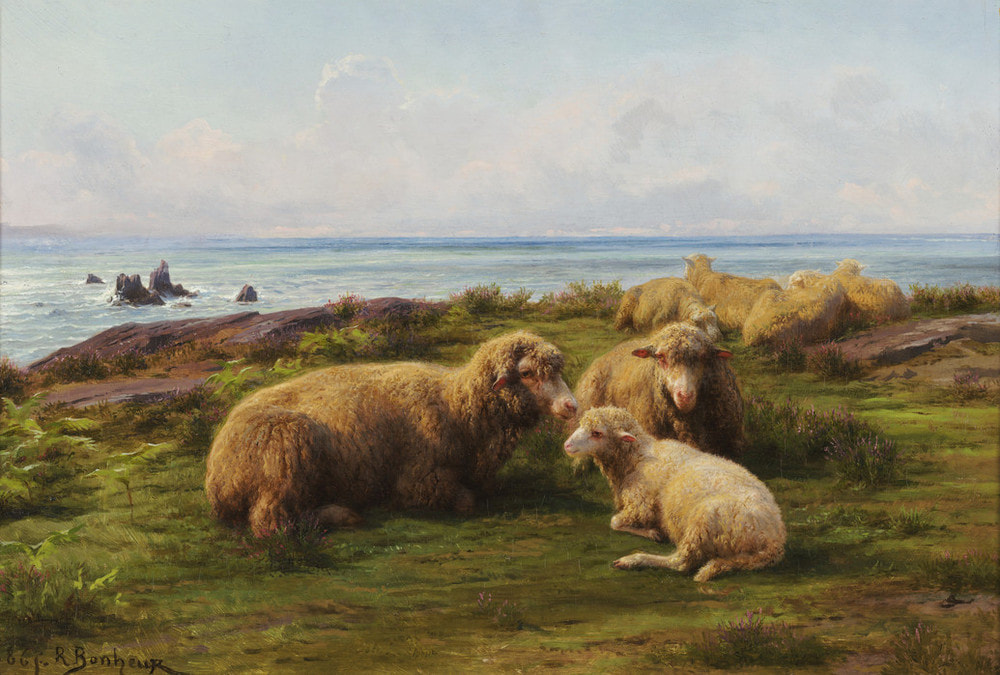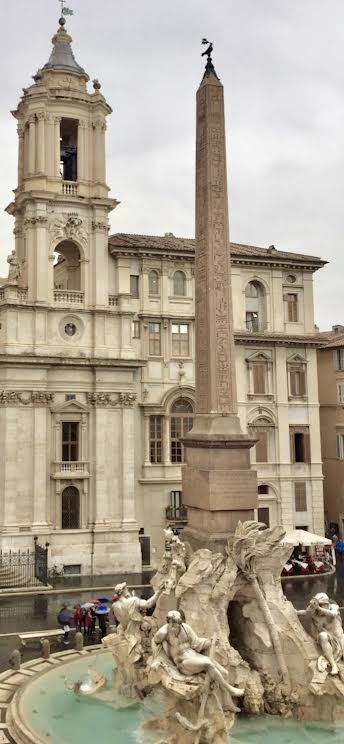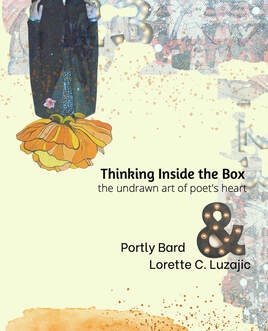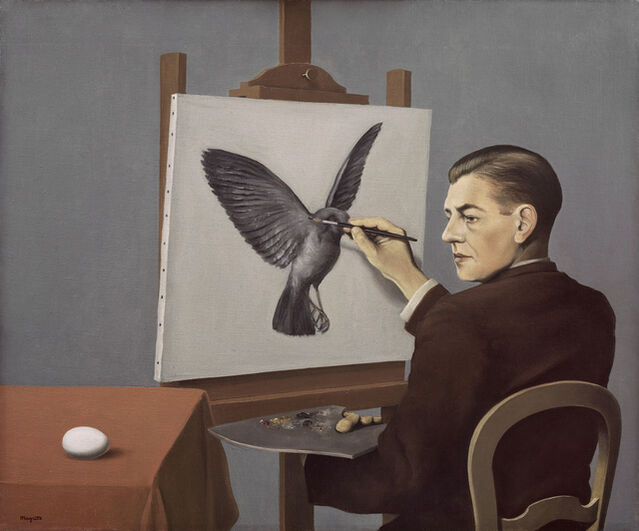|
After Harold Gilman Tea in a Bedsitter 1916 The room is an underwater grotto where we two women tout a sham harmony. Our glances glissando past a chair, spare for a hero gone. Nessa delves. Scavenger fish, she nuzzles my loss. Sea anemone, fronds aflutter, fingering for crumbs. My turned-away back provokes. Nudges blossom to a gull’s scissor-stabs, guzzling dead snapper. Kettle hiss, memory of waves splashing, leaping at bare legs as the man we both desired twirled me at the water’s edge. White tongues, myriad as stars, love’s vows, drenching till, dropping behind a dune, we shared strawberries, salt kisses, flesh. Rocking in the suck and swell, a tern’s limp body, shattered pledge of safe return. Wrecked hull poking from the sand, abandoned hope. Her words crowd in on me, fish shoaling, silver-scavenging my silence; nip toes, tickles sharpening to needle barbs. I daydream a cat, on a cushion before a log-coddled fire, curled in on itself like a woman’s longings. Tail aflicker, it sniffs our offerings. Milk on our granny’s saucer, porcelain, Venetian blue. Chicken breast, diced fine. Vain lures to tempt it to a lap. My dress strains, tightens. Hints my heart would hide, cradle, precious gems. Rubies. Pearls. Calcified tears. Pratibha Castle Pratibha Castle has been involved in creative endeavours since a young child, dancing, sing, and playing the piano. Trained as a classical singer, she formed a folk duo in the early 70s. A mother, holistic therapist, facilitator for women’s healing and meditation, her mother’s death inspired her to return to writing in her 50s when she received a first-class honours degree in Creative Writing, continuing with a CW Masters. She is published in print and online and been recognised in numerous poetry competitions. Her award-winning debut pamphlet A Triptych of Birds and A Few Loose Feathers published 2022 will be followed by a second book, depicting 60s Notting Hill and India.
0 Comments
Ibid, Ibid if typed I would not understand words strung out cut off Ibid page numbers Ibid 790 791 numbers as in numbing 4. 453 and lossians.1 as in Colossians an epistle the C reversed made partial slivered and 2 Ps P as in Paul and Os red circular fury crayon or marker as in zeroes or islands like Haiti or bodies of apostles and black something pressed pulled away a handprint of paper and pale pink like white flesh and masking tape beige cross-outs as in a cross and a single phallus O Painter you come with letters and numbers not wanting me to see all of what is there only what could be H.E. Fisher H.E. Fisher is the author of the hybrid collection STERILE FIELD (Free Lines Press, 2022) and JANE ALMOST ALWAYS SMILES, a poetry chapbook (Moonstone Press, 2022). H.E.’s work has appeared in Whale Road Review, Tupelo Quarterly, Indianapolis Review, and The Hopper, among other publications. H.E. was awarded the 2019 Stark Poetry Prize in Memory of Raymond Patterson at City College of New York, was a finalist in the 2020-21 Comstock Review Chapbook Contest, and has been nominated for Best of the Net. H.E. is the editor of (Re) An Ideas Journal. Solace Numbed by the world’s troubles I sit at my computer scrolling through everything but the news. Is it prayer, this clicking and clicking? All I can say is that I don’t quit until something inside shifts. Quickens. Tiptoes from shadow into light when I stumble into a trove of photographs that show how nicks and fissures in fragile, fractured things are fixed—in the ancient tradition of Kintsugi--with natural lacquer dusted with gold. Somehow consoled, I gaze at these cups, plates, teapots, shells-- for the moment restored, their frailties aglow. So like our hearts, those shattered bowls, their seams of fleeting brightness. Laura Ann Reed Laura Ann Reed holds a dual undergraduate degree in French/Comparative Literature from The University of California, Berkeley, and subsequently completed master’s degree programs in the Performing Arts and Clinical Psychology—prior to working as a leadership development trainer at the San Francisco headquarters of the United States Environmental Protection Agency. She and her husband currently reside in western Washington. Her work has been anthologized in How To Love the World, and is forthcoming in the SMEOP anthology: HOT, and in the anthology, The Wonder of Small Things. Her poems have appeared in Swimm and The Ekphrastic Review, among other journals. Thetis Receiving the Weapons of Achilles from Hephaestus Thetis, how could you join forces with Van Dyck letting your hero’s arms for cupids to rejoice and use as toys? You both seem to have got it wrong as many things in this canvas are off-sight, though being artistically god-damn right. Take the shape of the shield – measuring the man, realist van Dyck turned Homer’s epic round design into an efficient breastplate, but neither the pushing hands of smith and cupid, nor the aid of Thetis can lift this naturalistic motive to the original first ekphrastic narrative. Further down the trend is the mocking of the hero by putting his big helmet onto the small cupid’s head, and its crumbling creates a bad omen, as any Homeric man would have said; and which van Dyck knew first-hand, as the fall from the wall of his portrait of archbishop Laud pre-cursed his holiness’ fall from grace to grave. I get it that Van Dyck’s playful points could count as a lively antithesis to his stiff dressed-to-impress age, but such a childish detail can hardly be an emancipating tool for the poignant Homeric ideal. I get the counter point – an artistic deride of the ancient hyperbolism, as van Dyck wanted to turn myth into a daily bread for the hero-hungry world, but the juxtaposed steps of graceful Thetis and clumsy Hephaestus can hardly make a resolving stride. Above all, the heart of the matter cries: why Thetis, why did you order a shield, since you created his guarding coat with the dip in the waters of Styx and knew the only spot that remained unwashed – why didn’t you order Achilles a protection for his now proverbial heel, stamped by your holding hand? Answers van Dyck – brushing the light from the unseen furnace to iconize her face, and sending her train like fireball to unfold upon the ultimate perspective of God, stretching infinitely her troubled thought, but holding the looming future undisclosed, while all the rest are amused with demystifying the crux, no one grasping the simple factual flaw, where Fate normally nests her blow. By default, they all fill the off-sight bill; while the hero’s doomed spirit reels in the air and in the mind of the wired beholder. Myth and reality, mother and art, cupid and smith bestowing and withholding to revive anew the idolized paradigm in one go until mother Earth’s face is burnished with its glow! Ekaterina Dukas Ekaterina Dukas, MA, has studied and taught linguistics and culture at Universities of Sofia, Delhi and London and authored a book on medieval art for the British Library. She writes poetry as a pilgrimage to the meaning and her poems appeared in The Ekphrastic Review, its challenges and Poetrywivenhoe among others. Her poetry collection Ekphrasticon is published by Europa Edizioni, 2021. Sheep by the Sea Ekphrasis on “Sheep by the Sea” 1865 by Rosa Bonheur come all you who are weary and burdened tell us what is unfinished in you abandon the broom on the beach leave the broken wings in the field ask us how the ancient sea moves and yet remains We’ll tell you about the shearers who left town for the love they lost in this brute world the thunder-heads and head-aches bloom beyond the horizon beyond the reach of pain our lungs do their faithful work without dogma or flinch or scar our wool stitches the eyes of the wolf shut we are seven excuses not to shear or sacrifice we graze past the boundaries of your country you who wish to stay stay with our fine-spun weaves between us James LaMontagne James LaMontagne studied creative writing at the University of Massachusetts and has lived in Montana, Texas and Connecticut. He currently lives in South Hadley, MA. His poems have been published in a number of small press magazines. His most recent book is Merrick (Unsolicitous Press) in 2017. He has been a jazz bassist for 40 years in various jazz bands. Fontana dei Quattro Fiumi Some conflict will arise it is more than likely, the Four Rivers agree, coming together in an unlikely possibility. Scissored and shackled, torn at the lips, poured into ceramic vessels, a pointed finger ordered them to be told: Now, call this home. Now, be some gods. Now, here’s the rules. Make yourselves Travertine. Glide your currents like electric guitars, display yourselves in piazzas like buskers. But no songbirds. The River Tiber alone flows, is not set in stone. Despite her embanked bed she strolls onward toward the sea, sleep deprived, aware of injustice to her family tree, acquiesced to accepting silver dreams with resigned indignity. Yes, some conflict will arise claiming waterways, appropriating obelisks – solidified sun, crepuscular rays not carved from a single piece. Not prismatic. Not ecstatic. Inaccurate, arrowlike, and gray. Misinterpreted, like a dagger drawn to scratch an itch. This is how wars begin – with a muscle twitch. Costumed mimes fixed in time, mute duty to amuse. Bending to thirst, to blind applause, to eyes full of honeymoon wishes, and liquid murk of history. Río de la Plata, Danube, Nile, and River Ganges. I've become marble waiting for these weeping gods to unfreeze. Erica Goodkind Erica Goodkind turns words into creatures resembling fiction, poetry, essays, satire, and more. Her non-fiction has appeared online with The Fanzine, her poetry in the University of Washington’s Capillaries Journal, her humor/satire with The Belladonna Comedy, and her short fiction in an anthology published by Sidekick Press, True Stories. Erica is currently an English Creative Writing major at the University of Washington in Seattle.
Download your very own free digital copy of this collaboration between TER editor Lorette C. Luzajic and TER poet Portly Bard. Portly Bard wrote over 100 sonnets inspired by the mixed media artwork of Lorette. We turned these pairings into a full colour book featuring artworks, poems, and a back and forth dialogue between two artists about ekphrasis, art, and poetry. The button above will give you the PDF, completely free. Our primary goal was to share this unexpected merging of creativity with the ekphrastic community. We wanted the hardcopy versions to be as accessible as possible. The price point is reasonable considering the book is 8x10" and full colour. We have offered the digital version for an optional $10 CAD and free to anyone who asked. It would make us very happy if you would download the PDF above- it's completely free!!- and peruse our labour of love. Merry Christmas and Happy Holidays to All from Lorette and Portly Bard ** The hardcover full colour edition is also available at Amazon on sale today for $36 USD. This is a coffee table book and a great price if you'd like this for your library. The sale is an Amazon sale and we have no control over how long it is up for! Take advantage if you'd like a hardback version. Click below: HARDCOVER AT AMAZON Slugger It ended, as these things do, with paramedics and ten pounds of stale hard candy. Back in the early seventies, long before the good folks of Wyoming discovered the concept of cultural appropriation and that religions other than Christianity and Capitalism existed, we celebrated the onrushing holiday with an actual Christmas party in our ornament-bedecked elementary school classroom. Chained loops of green and red construction paper snaked around the tree, doorways and bulletin boards. Apple juice was guzzled and homemade, non-individually-wrapped baked goods were brought from home and devoured. Kids who brought popcorn balls were shunned and relegated to the bottom castes forevermore. Twenty-three ten year-olds, ripped to the gills on sugar and Elmer’s glue, shouted carols and produced blizzards of glitter as our teachers counted the seconds until the end of the day and the snort of holiday hooch in the teachers’ lounge that signaled the official start of Christmas break. And this was not just any school Christmas party, no siree Bob. Holiday season 1972 would be ushered in by the fifth-graders of Southridge Elementary with a genuine Mexican Christmas Fiesta! This meant we all wore the cheap straw sombreros we had decorated earlier in the day (hence the glitter dusting the eyelashes of the newly beguiling girls and nestling deep in our lungs, sowing the seeds of romance, and, possibly, silicosis). We belted out Jose Feliciano’s Feliz Navidad and the traditional La Cucaracha (because hey, what says Christmas better than a song about Pancho Villa’s weed-powered car?). Our teacher, Miss Fernmeyer, always a sport, wore a serape. The grand finale (or “grand finally,” as I heard one classroom aide mutter to another) of this multicultural extravaganza would be the breaking-open of the Christmas piñata, a four-foot tall, green and red papier-mâché Santa, replete with sunglasses and pompom-topped sombrero. I waded into this giddy melee with a pre-adolescent heart full of Christmas spirit and hope. Two glorious weeks filled with sledding, skating, presents and a visit to Grandma’s house awaited, and even more auspiciously, my parents’ resistance to my demands for the Daisy Safari Mark I Repeater seemed to be waning. Knowing glances were exchanged between them as they told me no, no BB-gun, absolutely not. Did they think I was an idiot? I spent my hours in a daze of anticipation. Also, I was in love. Maggie Collins, my best pal and neighbour from three houses over in the cul-de-sac, the tomboy with whom I had spent endless hours over the years doing homework, hunting fossils, playing kick the can and red rover on long summer evenings, or making snow forts after spring blizzards, had suddenly taken on a lustrous new sheen. She had wavy red hair and deep green eyes, pale skin festooned with vast constellations of freckles. That day she wore denim overalls over a festive Christmas sweater, which all seemed to fit her a little differently, somehow. I had no idea what was happening to her, or to me, but I was bewitched and decided to roll with it. From deep in my mother’s jewelry box I had stolen a bracelet I knew she never wore and would never miss. I wrapped the bracelet, much more carefully than I had the suction-cup dart pistol I had brought for Joey Padilla, my Secret Santa partner, and carefully hid it among the books and supplies in my classroom cubby. My plan was to give Maggie the bracelet, along with some cookies my mom had baked, on the walk home after school, and to ask her to “go steady,” an activity suddenly sweeping the fifth grade like an epidemic. I had no idea what going steady entailed, I just knew I wanted to do it with Maggie. All party long I had been casting her glances filled with wonder and apprehension. She would catch me, scowl, and mouth, “What?” while checking for something amiss with her ensemble. I just shrugged and smiled dreamily. It was in this state of mind that I heard my name being called. Piñata time. I was presently relieved of my sombrero, with its brim filled with ornaments and plastic holly. I was blindfolded, spun around several times, and handed a Louisville Slugger. What could possibly go wrong? I took a deep breath, settled into my well-practiced little league stance, and before anyone might intervene, stepped into the swing as I had been taught. I connected, but the piñata had much less give than I had anticipated. And it sounded a bit like someone dropping a coconut on the sidewalk. For a second the room was filled with a terrible silence. Someone smart removed the bat from my hand. I struggled to untie the bandanna with which I had been blindfolded as around me all hell broke loose. A teacher shouted a word not appropriate for a school setting, while twenty-one students gasped as one. The twenty-second, of whose identity I was yet unaware, emitted a sort of strangled “eep.” This was bad. I learned just how bad when I finally solved the knot and the bandana fell away, revealing Maggie Collins, love of my life, somehow still on her feet, hand clasped over the already visible knot rising above her right eye, face the color of a ripe persimmon, shaking, fighting back tears and skewering me with a look of unadulterated hatred. Going steady, apparently, would be out of the question. I was walked past the forgotten and desultory piñata, with its cargo of Jolly Ranchers and party favors, to a nearby classroom, where I watched, distraught and worried, as Maggie, strapped to a gurney and headboard, was wheeled down the hall and out the front door. I walked to the window, watched the ambulance roll away slowly through the slush. Maggie escaped with a mild concussion and a headache. I returned the bracelet to my mother’s jewelry box, gave Maggie some flowers instead. She forgave me, let me read her a few pages of the book we’d been assigned to finish over Christmas. As for the Daisy Safari Mark I Repeater, well, you’d have to be crazy to give a firearm to a kid who stole jewelry and clocked people in the melon with a baseball bat, right? Not where the only thing more sacred than the baby Jesus on Christmas was giving a kid a gun. On Christmas morning I opened that long, narrow box in a state of giddy disbelief. The next day I handed the air rifle to Maggie so she could take a few shots at the target affixed to a haybale in my back yard. Before taking aim she stroked the stock and barrel of the little gun with a surprising tenderness. Big flakes fell softly all around. She hoisted the gun to her shoulder, pulled the trigger, shuddered softly as the pellet pierced the target dead center, her mouth a little O of pleasure and surprise. Brent Terry This essay first appeared in Queen Mob's Tea House. It is more of a reverse ekphrastic, as Lorette created the artwork inspired by the essay. Brent Terry hails from the forests of southern New England, where he recites poems and performs interpretive dances for tiny woodland creatures. His stories, essays, reviews and poems have appeared in dozens of journals, and he is the author of four collections of poetry. The Body Electric, a novel, was published in 2020 by Unsolicited Press. Terry has been nominated for the Pushcart Prize, Best of the Net, a PEN Faulkner Award for Fiction, and the Connecticut Book Award for Poetry. He was the 2017 winner of the Connecticut Poetry Prize. He is an accomplished spoken word artist and has collaborated on work with visual artists, musicians and dancers. He teaches at Eastern Connecticut State University, but yearns to rescue a border collie and return to his ancestral homeland of the Rocky Mountain West. Brent was the poetry judge for the Lucky Seven ekphrastic marathon summer of 2022. When You Picture Me, Make Me Something Stranger There’s a woman in a hat and she’s walking up to a house. Whatever hat you’re imagining, throw it out and replace it with something more interesting. If it has a brim, make it a fez. If it's casual, make it a pope hat with gold trim and tails. It doesn’t matter which, just that there’s a woman in a hat, but it’s not the hat you expect. I said she’s walking up to a house and that’s true, but it’s not her house. Maybe it once was, maybe it will be, but right now it isn’t. And right now is when she’s heaving her bag up the walk. (Are you picturing a suitcase? Make it a rucksack, or a shopping bag full of bones.) Anyway, the walk is a very lonely place, as you’ve probably guessed because she’s heaving this heavy bag by herself. (Context clues are still good for something.) But it’s not the loneliness she notices here on the bricks out in front of the house that’s not hers. It’s the awkwardness of heaving yourself toward the door of someone else’s house while juggling a rucksack or a bag of bones and trying to keep your fez or your pope hat on your head as the wind picks up and still look casual while you do it. It’s the laugh on your lips that says “my hat is so interesting, certainly someone will open that door.” It’s the lightless gaze of the windows. And all while you rehearse what you’ll say when they answer, who to trust with this bag, how you’re going to ask this impossible thing of a house, of a person, of a body that is not yours. Kate Needham Kate Needham is a flash fiction writer who loves everything fantastic and speculative. Originally from Kansas City (MO!), she is currently working toward her PhD at Yale where she researches, writes, teaches first-year composition and neglects her houseplants. She is on Twitter at @katenedwed and kateneedham.com. This painting is attributed to Gertrude Abercrombie, but is possibly a fraud. The work is part of an investigation into art market hoaxes. Learn more here. Ode to Necrophilia, Mexico City, 1962 (Leonora Carrington), by Kati Horna (Mexico, b. Hungary) 1962
All Our Grieving Mothers In this room, a flame casts its veiled shadow. A mother, barefoot by the unmade bed, clutches herself through silken shawl and lace, graceful as an alabaster death mask. Her heart, a stricken bird trembling between life and mortality – the sputtering engine of language, of memory. Through the window, the trees are not trees but silence itself, shrouded in the stinging abstraction of day: a brightness so full it burns the eye. Tom Velho Tom Velho is a poet and teacher from London. By day he teaches Modern Languages and Literature. He has had work in Red Ogre Review, Overheard, and The Delinquent. Twitter: @velho_tom |
The Ekphrastic Review
COOKIES/PRIVACY
This site uses cookies to deliver your best navigation experience this time and next. Continuing here means you consent to cookies. Thank you. Join us on Facebook:
July 2024
|
||||||
